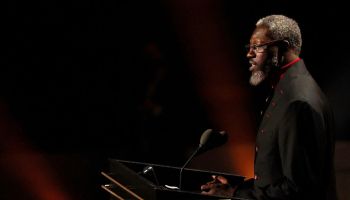After hearing actor Morgan Freeman call Black History Month “ridiculous” on a television news show a few years ago, New York filmmaker Shukree Hassan Tilghman set out to challenge the February tradition, reports Reuters.
His resulting documentary, “More Than a Month,” premieres Thursday night on public broadcasting’s “Independent Lens” film series. It also is being screened and discussed in more than 75 cities around the country this month, Tilghman said.
In the film, Tilghman questions whether the month-long designation exiles African-American history to “the shortest and what seems like the coldest month of the year,” and whether it means “that black people don’t matter outside February.”
Wearing signboards that read “End Black History Month” and “Black history is American history,” he stood on New York street corners gathering signatures on a petition to do away with the celebration that was started as Negro History Week in 1926 by scholar Carter G. Woodson and became Black History Month in 1976.
By presidential proclamation, February now is called African-American History Month. This year’s theme is the achievements of African-American women.
“We exist 24-7, 365, and in a leap year, 366. So should our history,” one petition-signer told Tilghman in the film.
Tilghman, 32, is African-American and a graduate of New York University and Columbia University film schools who has worked as an editor on cable television shows.
He grew up celebrating Black History Month and said he never knew life without it. His activist parents, who were Muslims in the 1970s, took him to the Million Man March in Washington in 1995 and to abortion rights rallies.
“For people in my generation, 30 to 35 or younger, there was a sense of a lack of impact,” Tilghman said. “The month was almost not potent enough. At some point, I felt condescended to.”
With funding from the Independent Television Service, Sundance Institute and the National Black Programming Consortium, Tilghman traveled the country gathering material for the hour-long film. He talked about race and history with advertisers, scholars and activists, including his parents, and most were appalled by the idea of ending Black History Month.
Daryl Michael Scott, professor of history at Howard University in Washington, called Tilghman naive in the film, asking him to “stop playing post-racial identity games” and schooling him on the dangers of ending Black History Month.
“Older people told me ‘Don’t forget what we did to even have Black History Month,'” Tilghman said. “The field of African-American history had to be created because people didn’t think that black people in America had anything worth talking about. This notion of moving beyond a Black History Month is actually a continuation of that mission and not in opposition.”
Tilghman visited groups who want their own history month, including the Sons of Confederate Veterans in Lexington, Virginia, to see why they would seek such a distinction.
“One of the ways that we exercise power is to have ownership of the story of America,” he said.
He said in the film he was searching for a “post-racial” America after the election of Barack Obama as the country’s first African-American president.
That America doesn’t exist, said Marcus Cox, director of the African-American studies program at The Citadel military college in Charleston, South Carolina.
President Obama “has all the qualities of leadership that have historically been attributed to white males,” Cox said. “But I can pick up the newspaper every day and see all kinds of racism, bigotry, discrimination, not just toward African-Americans but toward Hispanics, gay Americans.”
















